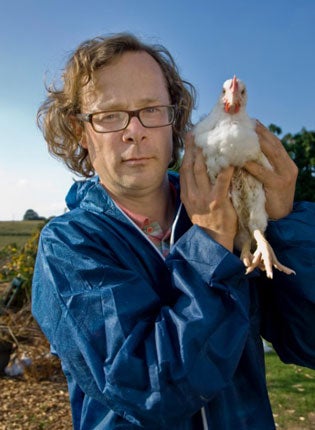Tesco in secret talks to improve chicken welfare
Supermarket giant looks at poultry conditions after campaign by celebrity chef

Your support helps us to tell the story
From reproductive rights to climate change to Big Tech, The Independent is on the ground when the story is developing. Whether it's investigating the financials of Elon Musk's pro-Trump PAC or producing our latest documentary, 'The A Word', which shines a light on the American women fighting for reproductive rights, we know how important it is to parse out the facts from the messaging.
At such a critical moment in US history, we need reporters on the ground. Your donation allows us to keep sending journalists to speak to both sides of the story.
The Independent is trusted by Americans across the entire political spectrum. And unlike many other quality news outlets, we choose not to lock Americans out of our reporting and analysis with paywalls. We believe quality journalism should be available to everyone, paid for by those who can afford it.
Your support makes all the difference.Tesco has been secretly meeting poultry farmers to discuss improving the life of its 200 million broiler chickens.
Britain's biggest retailer, under fire for selling chickens for £1.99, attended its first meeting of a Department for the Environment, Food and Rural Affairs (Defra) group aimed at raising poultry welfare late last year.
The meeting took place under "Chatham House rules", rendering all contributions anonymous, but Tesco's participation is revealed by the chef Hugh Fearnley-Whittingstall at the end of a Channel 4 show tonight updating viewers on his campaign for free-range poultry. In programmes last January, Fearnley-Whittingstall exposed conditions for standard broiler chickens, which develop leg burns from sitting and walking in sawdust soaked with urine and faeces. Last summer, the chef bought a single share in Tesco so he could table a shareholder resolution calling for the retailer to make all its chicken meet RSPCA standards – or drop its claim to be kind to animals.
Tesco fought his campaign all the way and the resolution was roundly defeated, but following the failure of 20 per cent of shareholders to back the company's position – an unusually strong protest at a FTSE 100 AGM – Tesco began talks on chicken welfare.
A Tesco spokeswoman, Dharshini David, said the meeting of the England Implementation Group on Poultry had discussed labelling, welfare, sustainability and below cost selling but she denied it represented a change in policy.
"We are always looking at improving welfare," she said, urging the company's most prominent critic to "recognise" some shoppers have limited budgets.
According to data from retail analysts TNS, released by the charity Compassion in World Farming, the chicken campaign has been a success, with free-range sales up 35 per cent and higher welfare chicken rising 42 per cent last year. But 82 per cent of birds remain in intensive indoor systems, where up to 50,000 are crammed into artificially-lit sheds without access to stimulus.
Dr Lesley Lambert, CIWF director of Research, said: "The reality is most chicken meat sold in our supermarkets comes from chickens that are intensively reared. Scientific studies show more than a quarter suffer lameness, alongside other major welfare issues such as sudden death syndrome, lung and heart difficulties." All chicken sold at the Co-operative, M&S and Waitrose is higher welfare and Sainsbury's has committed to do likewise. Fearnley-Whittingstall, whose show is called Chickens, Hugh and Tesco too, told The Independent: "What Tesco has done is a bit more than window dressing but a lot of it is window dressing."
Join our commenting forum
Join thought-provoking conversations, follow other Independent readers and see their replies
Comments